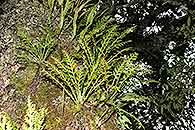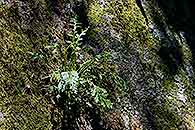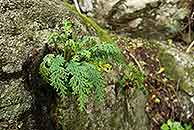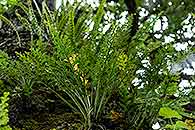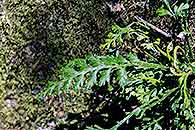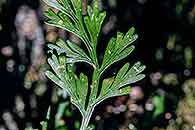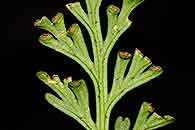Synonyms |
Davallia concinna Schrad.
Loxoscaphe theciferum (Humb., Bonpl. & Kunth) T.Moore subsp. concinnum (Schrad.) Pic.Serm.
Asplenium theciferum (Humb., Bonpl. & Kunth) Mett. var. concinnum (Schrad.) Schelpe
Loxoscaphe theciferum (Humb., Bonpl. & Kunth) T.Moore var. concinnum (Schrad.) Kuhn
Davallia campyloneura Kunze
Loxoscape concinnum (Schrad.) T.Moore
Asplenium concinnum (Schrad.) Kuhn.
Asplenium theciferum sensu Sim
Asplenium theciferum (Humb., Bonpl. & Kunth) Mett. subsp. concinnum (Schrad.) Bonap.
|
Common name |
|
Description |
Rhizome erect, up to 12 mm in diameter; scales dark brown, lanceolate, apex gradually tapering to a point, margin ciliate, 3-7 mm long.
Fronds tufted, not proliferous, fleshy. Stipe up to 18 cm, set with few brown lanceolate scales 1-2.5 mm long, becoming subglabrous with age, narrowly winged.
Lamina 9-26 cm × 2.5-7 cm, 2-pinnate to 3-pinnatifid, narrowly oblong-elliptic to lanceolate in outline, basal pinnae hardly reduced, dull green in colour. Pinnae 10-17 pairs, alternate, angled upwards, oblong to narrowly oblong-obtuse in outline, divided into linear-spathulate lobes, with the costa winged, glabrous or with few scales like those on stipe to 1.5 mm long. Rhachis winged. Sori up to 2 x 2 mm, bulbous, oblong to circular, terminal on or just below the apex of the ultimate lobes, set off-centre, each lobe carries a single sorus, indusium oblong to broadly oblong, membranous, entire, to 1 mm wide.
|
Notes | Confusion with A. rutifolium; A. theciferum has sori born on the tips of the ultimate lobes, a narrowly winged stipe and a thinner rhizome.
|
|---|
Derivation | -theca: capsule bearing, referring to the terminal structure of the bulbous sorus;
connicum: pretty, elegant, referring to the pleasant look of this fern.
|
|---|
Habitat | Deeply shaded moist evergreen forest, sometimes in woodland or thicket.
|
|---|
Distribution worldwide | Africa, Comoro Isl., Madagascar. |
|---|
Distribution in Africa |
Angola, Burundi, Cameroon, Dem. Republic of Congo, Equatorial Guinea (incl. Bioko), Ethiopia, Kenya, Malawi, Mozambique, Rwanda, South Africa, Sudan and South Sudan, Swaziland, Tanzania , Uganda, Zambia, Zimbabwe. |
Growth form |
Epiphytic, lithophytic. |
Literature |
Beentje, H.J. (2008) Aspleniaceae.Flora of Tropical East Africa, Page 55. As Asplenium theciferum var. concinnum (Includes a picture).
Burrows, J.E. (1990) Southern African Ferns and Fern Allies. Frandsen, Sandton. Page 238. (Includes a picture).
Crouch, N.R., Klopper, R.R., Burrows, J.E. & Burrows, S.M. (2011) Ferns of Southern Africa, A comprehensive guide. Struik Nature. Pages 632 - 633. (Includes a picture).
Fisher E. & Killmann D. (2008) Illustrated Field guide to the Plants of Nyungwe National Park Rwanda. University of Koblenz-Landau. Pages 66 - 67. (Includes a picture).
Fisher, E. & Lobin, W. (2023) Synoptic Revision of Aspleniaceae (Asplenium, Hymenasplenium) of Rwanda.Phytotaxa, 608 (1) Pages 45 - 46.
Jacobsen, W.B.G. (1983) The Ferns and Fern Allies of Southern Africa. Butterworths, Durban and Pretoria. Pages 378 - 379. (Includes a picture).
Kornas, J. (1979) Distribution and ecology of the Pteridophytes in Zambia. Polska Akademia Nauk Wydzial II Nauk Biologicznych. Pages 103 - 104.
Ntore, S. & al. (2024) Checklist of the vascular plants of Burundi. Meise Botanic Garden. Page 29.
Roux, J.P. (2001) Conspectus of Southern African Pteridophyta.Southern African Botanical Diversity Network Report, 13 Pages 171 - 172.
Roux, J.P. (2009) Synopsis of the Lycopodiophyta and Pteridophyta of Africa, Madagascar and neighbouring islands. Strelitzia 23, South African National Biodiversity Institute, Pretoria. Page 98.
Schelpe, E.A.C.L.E. (1970) Pteridophyta.Flora Zambesiaca, 0 Page 188. (Includes a picture).
|
